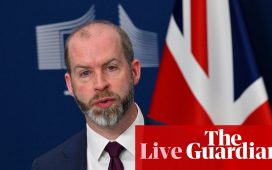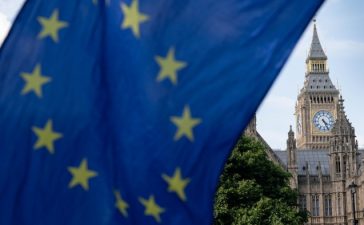Investors should brace for another turbulent year in the financial markets, economists have warned as central banks fight inflation, China reopens its economy after Covid-19 restrictions and the Ukraine war pushes the global economy towards recession.
The first half of the new year is likely to be choppy, according to Wall Street predictions, after global markets suffered their biggest fall since the 2008 financial crisis last year.
But the US S&P 500 is still expected to end 2023 a little higher than it began the year. The average target of 22 strategists polled by Bloomberg has the S&P 500 ending 2023 at 4,078 points – about 6% higher than it ended 2022.
Economists predict the US Federal Reserve will slow its interest rate hikes this year, as the outlook for America’s economy sours. US inflation has dropped back from its peak last summer, while the series of Fed rate hikes in 2022 has also cooled the housing market.
“We believe that a period of sub-trend growth is inevitable, and recession risks are high as the lagged effects of tighter monetary policy work their way through the economy,” said Brian Rose, senior US economist at UBS Global Wealth Management.
Michael Antonelli, managing director and market strategist at investment bank Baird, predicted the Fed would end its hiking cycle in February, and “hit the pause button” after one more rate rise. He also expects the US stock market to make gains during 2023, pointing out that two consecutive falls are “very rare”.
“The stock markets all about ‘Are things getting better or are things getting worse?’ I think they will get slightly better next year,” Antonelli told Yahoo Finance Live.
“I don’t think we’re getting any big gains, but I think next year will be somewhat positive,” Antonelli added.
Deutsche Bank predicts economic downturns this year, which will hit financial markets.
“We see major stock markets plunging 25% from levels somewhat above today’s when the US recession hits, but then recovering fully by year-end 2023, assuming the recession lasts only several quarters,” Deutsche Bank analysts said in their 2023 World Outlook late last year.
Strategists at Russell Investments believe a recession seems likely in 2023 and equity markets may struggle but remain hopeful a global economic recovery should be on the horizon by year-end.
The head of the International Monetary Fund has warned that this year is going to be “tougher than the year we leave behind”, with a third of the world’s economy in recession. Kristalina Georgieva said it would be “because the three big economies – the US, EU and China – are all slowing down simultaneously”.
A global downturn could prompt central banks to reverse some of the hefty interest rate rises implemented in the last year. Nikolaj Schmidt, chief international economist at investment management firm T. Rowe Price, predicts that central banks will ease monetary policy early in the second half of 2023.
“We see the world plunging into a global recession in 2023. The recession is going to be the result of the immense monetary tightening the central banks have administered over the past 12 months. As a silver lining, it will sow the seeds for a substantial retracement of inflation,” Schmidt said.
Analysts at investment bank Jefferies predict a global recession this year, but expect Asia could avoid an outright downturn. The region could benefit from a resurgence of tourism, as Chinese tourists begin to slowly return to travel.
“Global economic conditions continue to deteriorate as inflation remains high and market conditions tighten; however, Asia could be the best of a bad lot and avoid an outright recession. In the past shocks of the dotcom bust, and the GFC [Great Financial Crisis], Asia bounced back quickly, and we expect that it can do the same in 2023,” analysts at Jefferies said.
China’s decision to relax Covid-19 restrictions last month could ease global supply chain tensions, but may also lead to higher demand for commodities and energy, adding to inflation pressures.
The Bank of England is expected to raise UK interest rates again in coming months, with the bank rate hitting 4.5% in the summer, from its current 3.5%.
Britain’s FTSE 100 was one of the few larger share indexes to rise during 2022, gaining almost 1%. Ipek Ozkardeskaya, senior analyst at Swissquote Bank, predicted that the FTSE 100’s outperformance could stretch into the new year.
“If the Chinese reopening brings along another bump in inflation due to higher energy and commodity prices, the FTSE 100 could continue offering a good shelter to those willing to hedge against an energy-led global inflation to temper the negative effects,” she said.
“Of course, the biggest British companies do not reflect the underlying British economy, so the FTSE 100’s good performance won’t change the fact that smaller, and domestic focused companies will likely continue to suffer from high inflation, recession and perhaps another year of political turmoil as a cherry on top,” she warned.
Kevin Boscher, CIO at investment services group Ravenscroft, is hopeful that the economic environment will turn more favourable as the year progresses, lifting markets.
“Although the outlook remains problematic, asset prices should rebound as falling inflation allows central banks to cease their monetary tightening with rates expected to fall in the second half of the year,” Boscher said.
Paul Glover, chief investment manager at NFU Mutual, suggested 2023 could “pleasantly surprise investors”, citing encouraging signs that inflation may have peaked.
He added that the UK market could benefit from its significant international revenue exposure, and the potential for takeover offers for UK companies.
Russia’s economy has already fallen into recession, and its economic crisis is likely to continue in 2023.
“Having started a brutal war, Putin has no easy way out,” said economists at Berenberg bank. “Ukraine and the free world are standing up to him. The expenses of war, the slow poison of sanctions, the flight of parts of the urban elite and the mounting costs of repression will be a worsening drag on Russia as long as Putin remains in power.”








